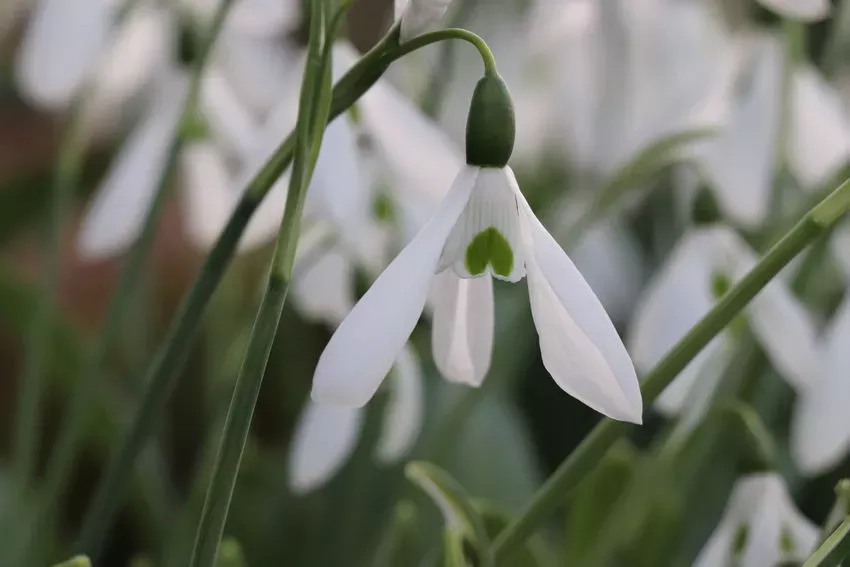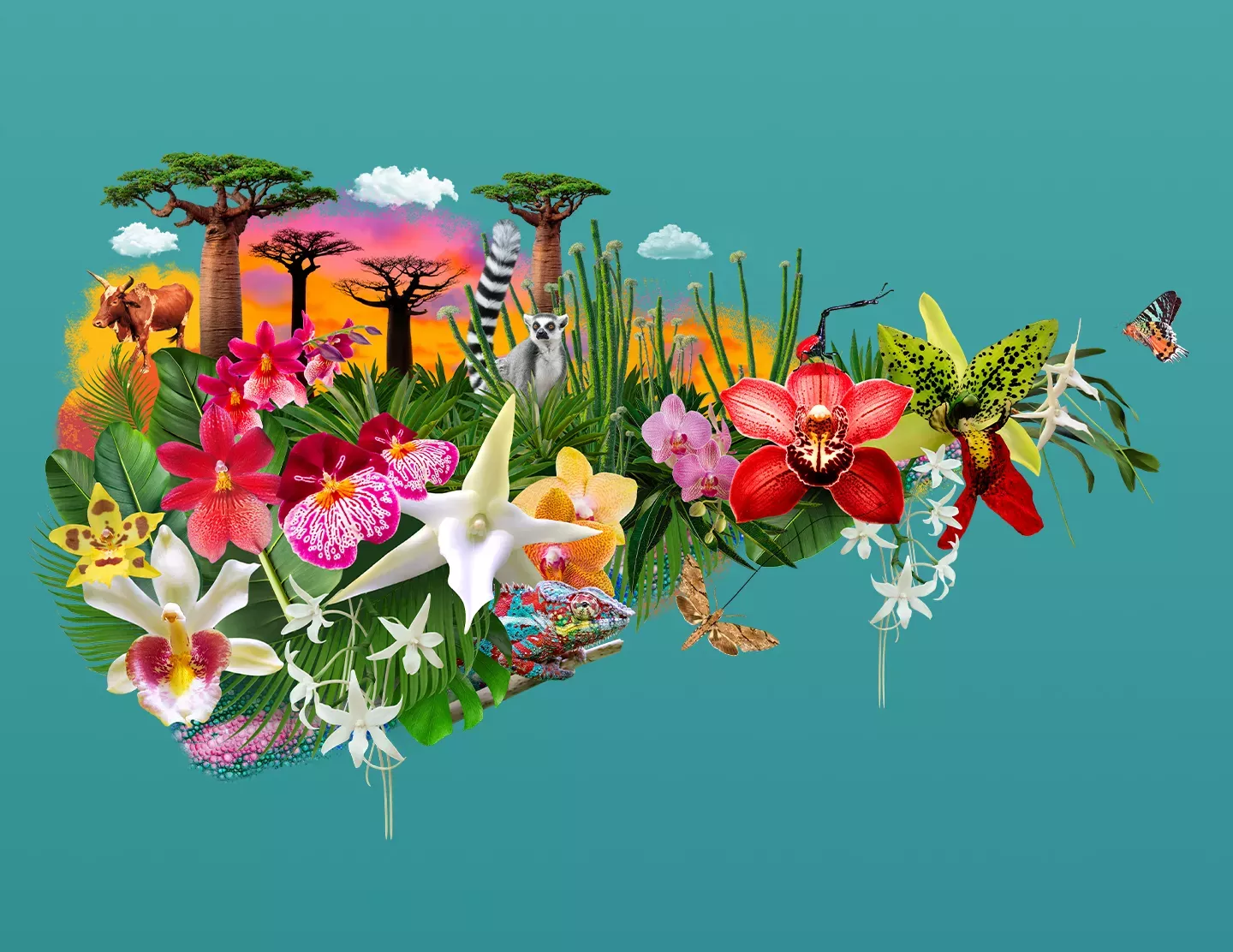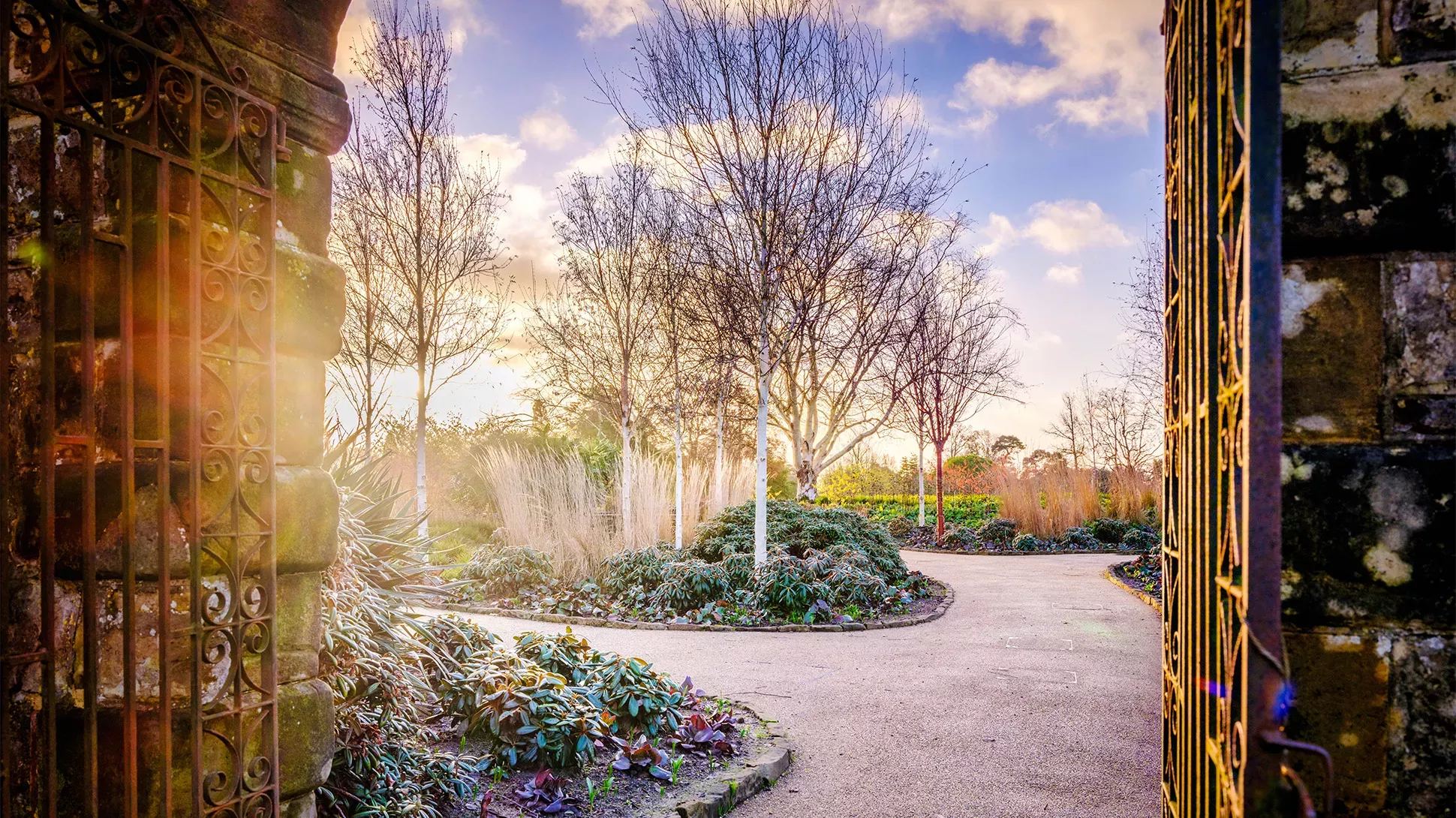What’s on this January at Kew Gardens and Wakehurst
Release date: 20 December 2023

- Final evenings for Christmas at Kew and Glow Wild
- Critically acclaimed exhibition Mat Collishaw: Petrichor continues at the Shirley Sherwood Gallery of Botanical Art
- Young Botanical Artists exhibition at Kew Gardens showcases stunning illustrations of the natural world
- The Winter Garden at Wakehurst celebrates its fifth anniversary
- Latest 5x15 Talk: Health and Nature
- Coming soon: Kew’s annual Orchid festival, this year inspired by Madagascar

Kew Gardens
Christmas at Kew - final days
Running until 7 January 2024, Christmas at Kew, a highlight of London’s festive calendar, enjoys its final magical evenings until November. This year’s trail features a host of firm seasonal favourites alongside pioneering new light installations, illuminating Kew Gardens’ UNESCO World Heritage landscape with vibrant bursts of colour, seasonal sounds and twinkling lights. A celebration of nature by night, and the wonder of biodiversity, this is an enchanting seasonal experience like no other, for visitors of all ages. Pre-booking essential, with limited availability.


Petrichor by Mat Collishaw | Entry included in admission
Continuing in the Shirley Sherwood Gallery of Botanical Art at Kew Gardens, Petrichor is a new, critically acclaimed exhibition of work from celebrated contemporary artist Mat Collishaw. Drawing on an array of evocative imagery from the natural world, this spectacular exhibition features sculptural installations using a variety of pioneering techniques to explore the relationship between the natural world, art history, and how representations of nature in art can impact the way in which we see the world around us.


Horticultural highlights
As well as winter highlights across Kew Gardens, visitors can enjoy the spectacle of Kew’s iconic glasshouses - the Palm House and the Temperate House - providing welcome respite from the chilly temperatures. Early flowering plants, including snowdrops and narcissus, can be found in the Rock Garden and Davies Alpine House.

Kew Publishing Book of the Month | Kew Pocketbooks: House Plants by Bryony Langley
Since the introduction of heat into homes, making it possible to keep potted plants alive, people have been obsessively collecting and caring for house plants. These now common additions add vibrancy and colour while simultaneously instilling a sense of tranquillity.
This new title in the Kew Pocketbooks series is a celebration of the integration of plants into our living spaces, showcased through 40 stunning paintings from the Kew archives. An introductory chapter by Kew expert Bryony Langley provides an overview of the plant group, and extended captions accompany each painting.

Young Botanical Artist Exhibition | Entry included in admission
Until April, Gallery 6 of Kew Gardens’ Shirley Sherwood Gallery of Botanical Art will showcase 50 shortlisted artworks from the inaugural Young Botanical Artist Competition. Created by The Shirley Sherwood Collection in collaboration with Royal Botanic Gardens, Kew, the competition was open exclusively to entrants aged 16-25, and offers a unique opportunity for the next generation of botanical artists to showcase their work in a gallery setting.
5x15 Talk: Health and Wellbeing | Monday 22 January
Join the next instalment in the co-curated series between Royal Botanic Gardens, Kew and 5x15; Health & Nature, featuring Wakehurst’s Interim Director Lorraine Lecourtois, David R. Montgomery, Anne Biklé, Marchelle Farrell and Kathy Willis CBE. The expert panel of speakers from around the world will be discussing wellbeing, diet, micro-nutrients and soil heath in this in-depth online conversation on healthy living and a healthy planet
Short Courses
Why not start the year with a new skill and sign up for a short course at Kew? Led by a selection of experts, these one-day courses offer unique opportunities to develop fresh skills within the stunning surroundings of Kew’s UNESCO World Heritage Site.
Grow your own mushrooms | 12 January | 10.30am – 1.30pm and 3pm – 6pm | Cambridge Cottage
In this 90-minute workshop you will be provided with everything you need to make your own oyster mushroom grow-at-home kit. Caley Brothers will take you through the basics of mushroom cultivation and teach you how to care for, store and get the most from your mushroom kit. You will receive guidance and an instruction booklet to help you through the growing and harvesting stages, following the workshop.
Stitch in bloom: Botanical embellishment workshop | 29 – 31 January | 10.30am – 4pm | Botanical Brasserie Restaurant
In this three-day course, you will discover alternative ways of using traditional embroidery stitches to create large-scale botanical embroidery combined with three-dimensional flowers. Textile artist Lora Avedian will guide you through how to translate your drawings into stitched lines and you'll have the unique opportunity to draw from our archive and Gardens.

Coming soon: Orchid festival 2024
Kew Gardens’ much-loved Orchid festival returns for 2024, taking over the Princess of Wales Conservatory from 3 February - 3 March. Kew’s 28th Orchid festival draws inspiration from the unique flora and fauna of Madagascar, the world’s fourth largest island and home to Kew’s third research site, the Kew Madagascar Conservation Centre.
Madagascar’s lush rainforests, tropical dry forests and over 3,000 miles of coastline will be reflected in an extravaganza of themed floral displays and living installations, transforming the Princess of Wales Conservatory into a colourful celebration which never fails to brighten up the winter months.

Horticultural highlights
In January, Wakehurst’s Winter Garden turns five and has evolved into a sensory centrepiece in the winter months, the perfect place to lift spirits on a cold day. Paths weave through bright red dogwood, and swathes of tall grasses, as brightly coloured Cyclamen and snowdrops offer a pop of colour on the ground.
Other sensory spots across the gardens include timeless winter fragrances in the Pinetum, the gentle sound of trickling water throughout the Water Gardens, and the 33ft high Canopy Walk, offering breathtaking views across the South Downs, as leafless branches open up new vistas.

Events
Glow Wild | Selected evenings 23 November – 1 January | 4.30pm - 10pm (last entry 8.20pm) | Various ticket options including flexible tickets
Sussex's ultimate festive trail is celebrating its tenth anniversary, featuring a never-before-seen route, brand new installations, and plenty of other surprises. As darkness falls, the gardens are brought to life with beautifully hand-crafted winter lanterns and captivating light installations created by leading artists.
With under 4s going free, Glow Wild is the perfect Christmas sensory experience for little ones. This year, Glow Wild celebrates the sublime, inviting visitors to become part of the trail and discover awe-inspiring moments in nature.
Book now for Sloth Saver | February half-term, 10 – 18 February | All day
Join the first Nature Heroes mission of the new year, and discover how to protect the rainforest that sloths, and other wildlife call home. Hang out with sloths designed by artist Fernando Laposse and find out why being slow is a superpower, on a quest to earn a Sloth Saver badge.
Planet Wakehurst | All day | Free with entry
Experience the UK’s largest outdoor art installation, as the impressive Planet Wakehurst photomontage wraps the Mansion, which is undergoing restoration. The 1500m2 canvas, showcases the wealth of biodiversity at Wakehurst and will be up for all to enjoy. Experience a new view of the gardens on our Canopy Walk, 33ft up!
Exhibitions
Surviving or Thriving: An exhibition on plants and us | Daily, 10am – 3.30pm | Millennium Seed Bank | Included with entry
This exhibition brings Kew’s State of the World’s Plants reports to life, telling the story of why some plants are only surviving, while others are thriving. Through film, audio, models, and a futuristic garden, explore the challenges that plants face and discover the vital role of fungi.
For more information, images, or to unsubscribe from this mailing list, please contact the Press Office at pr@kew.org.
ENDS
Notes to Editors
About Royal Botanic Gardens, Kew
The Royal Botanic Gardens, Kew is a world-famous scientific organisation, internationally respected for its outstanding collections and scientific expertise in plant and fungal diversity, conservation, and sustainable development in the UK and around the globe. Kew’s scientists and partners lead the way in the fight against biodiversity loss and finding nature-based solutions to the climate crisis, aided by five key scientific priorities outlined in Kew’s Science Strategy 2021-2025. Kew Gardens is also a major international and top London visitor attraction. Kew’s 132 hectares of historic, landscaped gardens, and Wakehurst, Kew’s Wild Botanic Garden and ‘living laboratory’, attract over 2.5 million visits every year. Kew Gardens was made a UNESCO World Heritage Site in July 2003 and celebrated its 260th anniversary in 2019. Wakehurst is home to the Millennium Seed Bank, the largest wild plant seed bank in the world and a safeguard against the disastrous effects of climate change and biodiversity loss. RBG Kew received approximately one third of its funding from Government through the Department for the Environment, Food and Rural Affairs (Defra) and research councils. Further funding needs to support RBG Kew’s vital scientific and educational work comes from donors, memberships and commercial activity including ticket sales. For tickets, please visit www.kew.org/kew-gardens/visit-kew-gardens/tickets. In the first six months since implementing a new accessibility scheme for those in receipt of Universal Credit, Pension Credit and Legacy Benefits, Kew has welcomed over 45,000 visitors with £1 tickets.
About Wakehurst
Please note that Wakehurst is referred to just as Wakehurst, not Wakehurst Place. It is not a National Trust property.
Wakehurst, Kew’s wild botanic garden in Sussex is home to the Millennium Seed Bank and over 500 acres of the world’s plants including temperate woodlands, ornamental gardens and a nature reserve. It is situated in the High Weald of Sussex, an Area of Outstanding Natural Beauty, and focuses on wild plant collections. The Millennium Seed Bank houses and protects seed from the world’s most substantial and diverse collection of threatened and useful wild plants, making it the most biodiverse place on earth.
RBG Kew receives just under half of its funding from Government through the Department for the Environment, Food and Rural Affairs (Defra) and research councils. Further funding needed to support Kew’s vital work comes from donors, membership and commercial activity including ticket sales.
In March 2021, RBG Kew launched its 10-year strategy Our Manifesto for Change 2021. The institution’s ultimate goal is step up to help to end the extinction crisis and contribute to creating a world where nature is protected, valued by all and managed sustainably. In the wake of a global pandemic, and with the future of the planet in peril, the strategy represents a public commitment by RBG Kew to do everything in its power to reverse the environmental devastation of biodiversity loss and climate change. The five key priorities are 1) Delivering science-based knowledge and solutions to protect biodiversity and use natural resources sustainably 2) Inspiring people to protect the natural world 3) Training the next generation of experts: 4) Extending our reach 5) Influencing national and international opinion and policy.
On May 25 2021 RBG Kew launched its new Sustainability Strategy – committing to become Climate Positive by 2030 and marking a step-change in our urgent action to tackle the climate and biodiversity crisis.